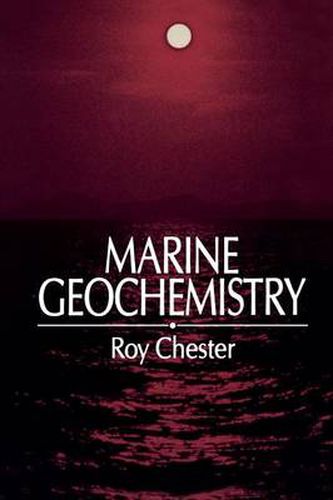Readings Newsletter
Become a Readings Member to make your shopping experience even easier.
Sign in or sign up for free!
You’re not far away from qualifying for FREE standard shipping within Australia
You’ve qualified for FREE standard shipping within Australia
The cart is loading…






This title is printed to order. This book may have been self-published. If so, we cannot guarantee the quality of the content. In the main most books will have gone through the editing process however some may not. We therefore suggest that you be aware of this before ordering this book. If in doubt check either the author or publisher’s details as we are unable to accept any returns unless they are faulty. Please contact us if you have any questions.
The past two or three decades have seen many important advances in our knowledge of the chemistry, physics, geology and biology of the oceans. It has also become apparent that in order to understand the manner in which the oceans work as a ‘chemical system’, it is necessary to use a framework which takes account of these interdisciplinary advances. Marine geochemistry has been written in response to the need for a single state-of-the-art text that addresses the subject of treating the sea water, sediment and rock reservoirs as a unified system. In taking this approach, a process-orientated framework has been adopted in which the emphasis is placed on identifying key processes operating within the ‘unified ocean’. In doing this, particular attention has been paid to making the text accessible to students from all disciplines in such a way that future advances can readily be understood. I would like to express my thanks to those people who have helped with the writing of this volume. In particular, I wish to put on record my sincere appreciation of extremely helpful suggestions made by Professor John Edmond, FRS. In addition, I thank Dr S. Rowlatt for his comments on the sections covering the geochemistry of oceanic sediments, and Dr G. Wolff for his invaluable advice on the organic geochemistry of biota, water and sediments. It is a great pleasure to acknowledge the help of Dr K. J. T.
$9.00 standard shipping within Australia
FREE standard shipping within Australia for orders over $100.00
Express & International shipping calculated at checkout
This title is printed to order. This book may have been self-published. If so, we cannot guarantee the quality of the content. In the main most books will have gone through the editing process however some may not. We therefore suggest that you be aware of this before ordering this book. If in doubt check either the author or publisher’s details as we are unable to accept any returns unless they are faulty. Please contact us if you have any questions.
The past two or three decades have seen many important advances in our knowledge of the chemistry, physics, geology and biology of the oceans. It has also become apparent that in order to understand the manner in which the oceans work as a ‘chemical system’, it is necessary to use a framework which takes account of these interdisciplinary advances. Marine geochemistry has been written in response to the need for a single state-of-the-art text that addresses the subject of treating the sea water, sediment and rock reservoirs as a unified system. In taking this approach, a process-orientated framework has been adopted in which the emphasis is placed on identifying key processes operating within the ‘unified ocean’. In doing this, particular attention has been paid to making the text accessible to students from all disciplines in such a way that future advances can readily be understood. I would like to express my thanks to those people who have helped with the writing of this volume. In particular, I wish to put on record my sincere appreciation of extremely helpful suggestions made by Professor John Edmond, FRS. In addition, I thank Dr S. Rowlatt for his comments on the sections covering the geochemistry of oceanic sediments, and Dr G. Wolff for his invaluable advice on the organic geochemistry of biota, water and sediments. It is a great pleasure to acknowledge the help of Dr K. J. T.